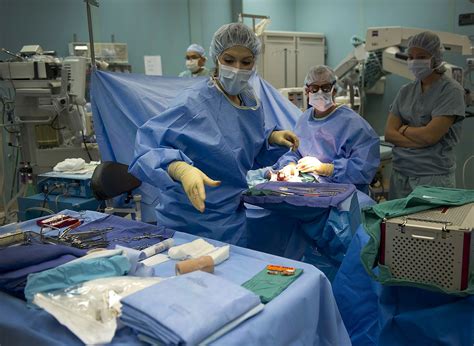Making a career transition from a surgical technologist to a registered nurse (RN) can be a challenging yet rewarding experience. As a surgical technologist, you have already gained valuable experience in the operating room and have a solid foundation in patient care. However, to become a registered nurse, you will need to acquire additional education and training. In this article, we will outline the 5 steps you can take to make a successful career transition from a surgical technologist to a registered nurse.
Step 1: Meet the Basic Requirements
Before starting your journey to become a registered nurse, you need to meet the basic requirements. These requirements typically include:
- A high school diploma or equivalent
- A certified surgical technologist (CST) certification
- A certain amount of work experience as a surgical technologist
- A clean background check
- A valid CPR certification
It's essential to check with your state's nursing board for specific requirements, as they may vary.

Step 2: Choose a Nursing Program
Once you have met the basic requirements, you need to choose a nursing program that suits your needs. There are several options available, including:
- Associate's degree in nursing (ADN)
- Bachelor's degree in nursing (BSN)
- Licensed practical nurse (LPN) or licensed vocational nurse (LVN) programs
- Online nursing programs
When choosing a nursing program, consider factors such as:
- Accreditation
- Program length and format
- Tuition and financial aid
- Clinical experience opportunities
- NCLEX-RN pass rates

Step 3: Complete Prerequisite Courses
Before starting a nursing program, you may need to complete prerequisite courses. These courses typically include:
- Anatomy and physiology
- Biology
- Chemistry
- English
- Math
Prerequisite courses can be completed at a community college or online. It's essential to check with your chosen nursing program to determine the specific prerequisite courses required.

Step 4: Apply to Nursing School
Once you have completed the prerequisite courses, you can apply to nursing school. The application process typically includes:
- Submitting an application
- Providing transcripts
- Taking the TEAS (Test of Essential Academic Skills) or HESI (Health Education Systems, Inc.) entrance exam
- Participating in an interview
It's essential to check with your chosen nursing program for specific application requirements.

Step 5: Pass the NCLEX-RN Exam
After completing a nursing program, you will need to pass the NCLEX-RN (National Council Licensure Examination-Registered Nurse) exam to become a licensed registered nurse. The NCLEX-RN exam is a comprehensive exam that tests your knowledge and skills in areas such as:
- Safe and effective care environment
- Health promotion and maintenance
- Psychological integrity
- Physiological integrity
To prepare for the NCLEX-RN exam, you can use study guides, online resources, and practice exams.

Gallery of Surgical Tech to RN Career Transition






What is the difference between a surgical technologist and a registered nurse?
+A surgical technologist is a healthcare professional who assists surgeons and other medical professionals during surgical procedures. A registered nurse is a healthcare professional who provides direct patient care and administers medications. While both roles are essential in the healthcare industry, they have different responsibilities and require different levels of education and training.
How long does it take to become a registered nurse?
+The length of time it takes to become a registered nurse depends on the type of nursing program you choose. Associate's degree programs typically take two years to complete, while bachelor's degree programs take four years to complete. Online nursing programs may have varying lengths depending on the program.
What are the benefits of becoming a registered nurse?
+Becoming a registered nurse can provide many benefits, including job stability, competitive salaries, and opportunities for advancement. Registered nurses also have the opportunity to make a positive impact on patients' lives and contribute to the healthcare industry in a meaningful way.
Making a career transition from a surgical technologist to a registered nurse requires dedication, hard work, and perseverance. By following the 5 steps outlined in this article, you can successfully transition into a new career and start a new chapter in your life. Remember to stay focused, motivated, and committed to your goals, and you will be on your way to a successful and rewarding career as a registered nurse.
